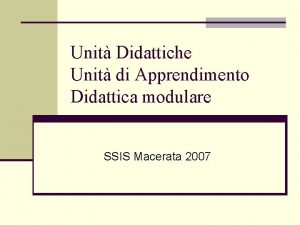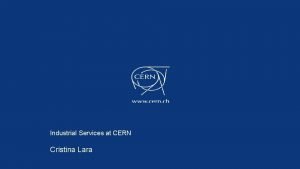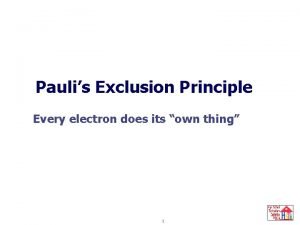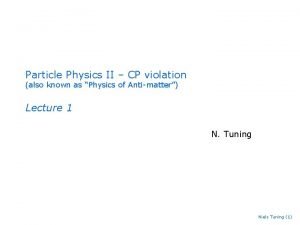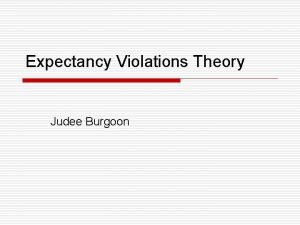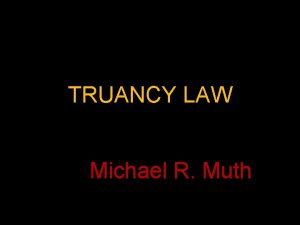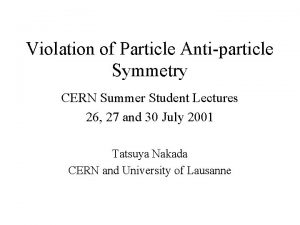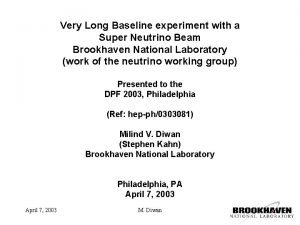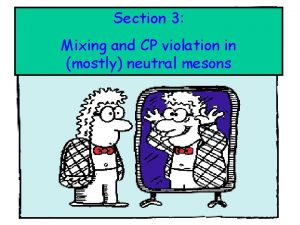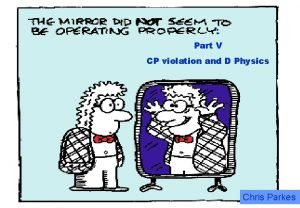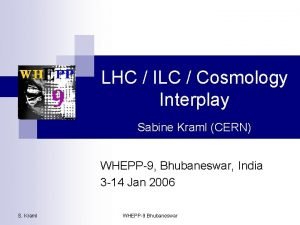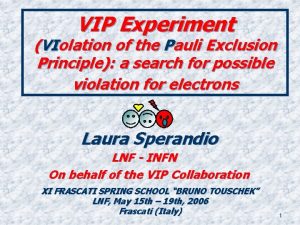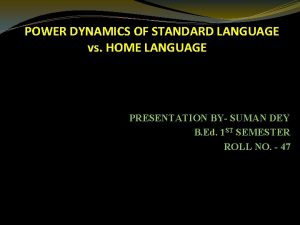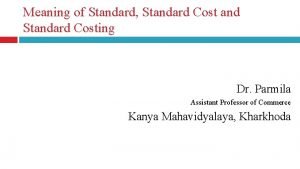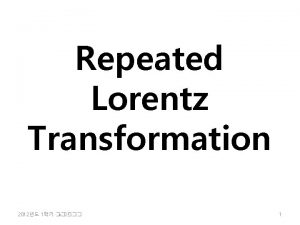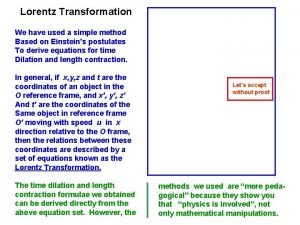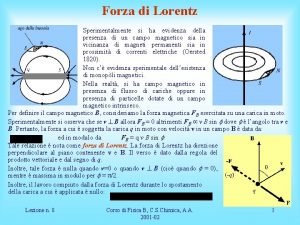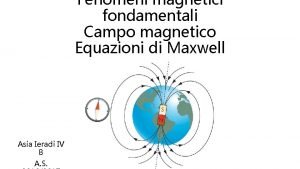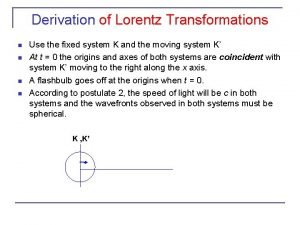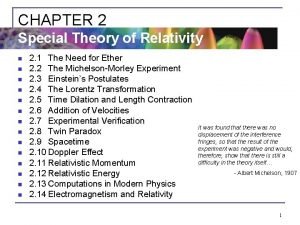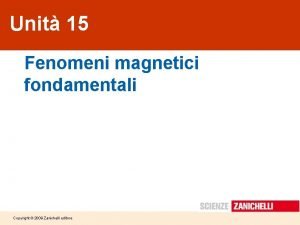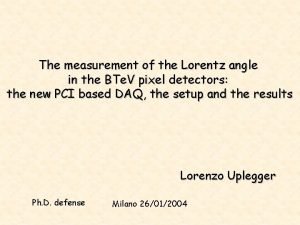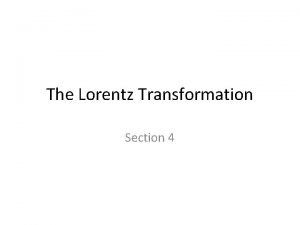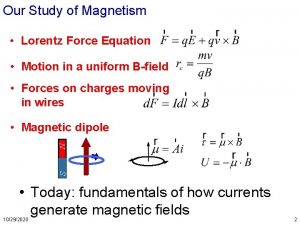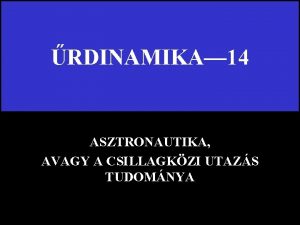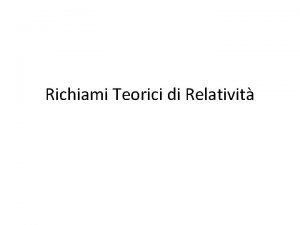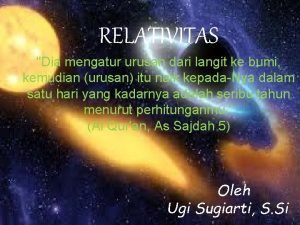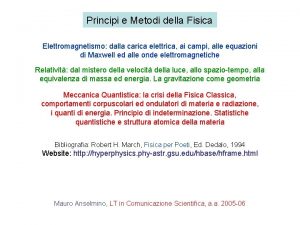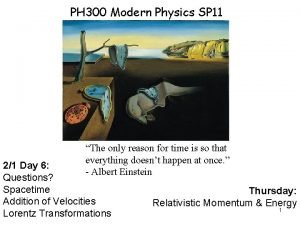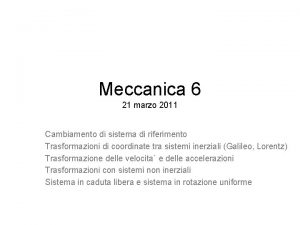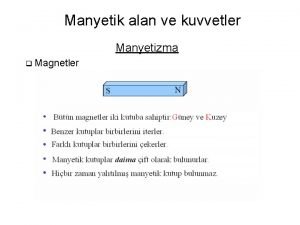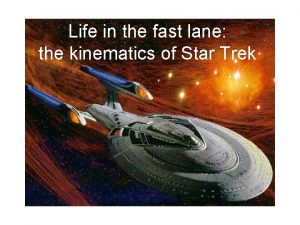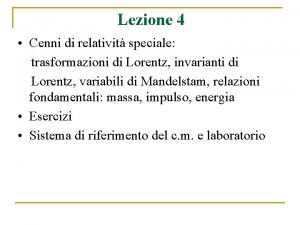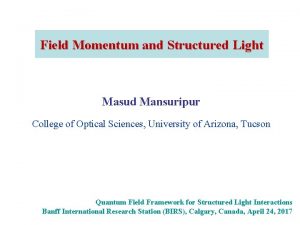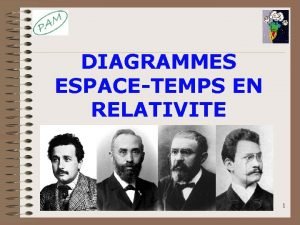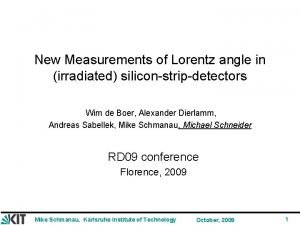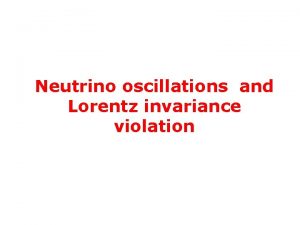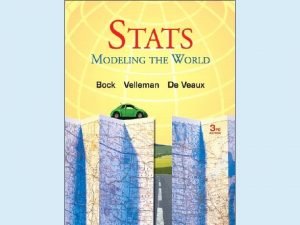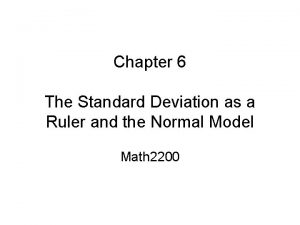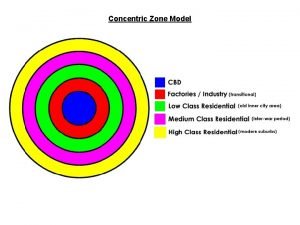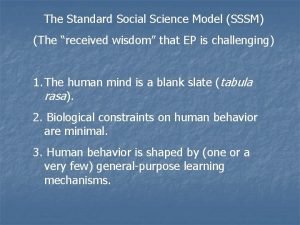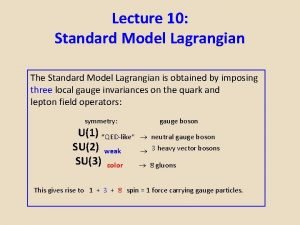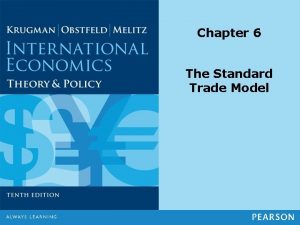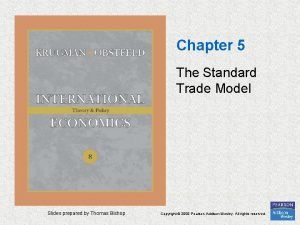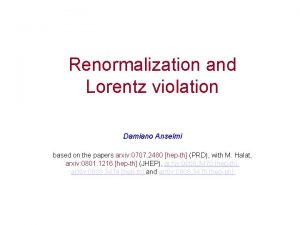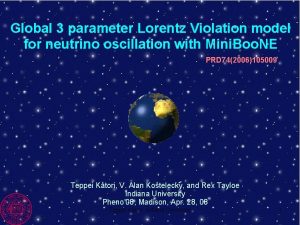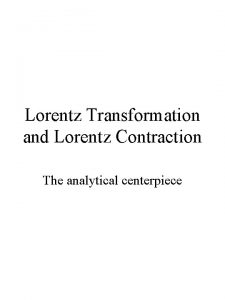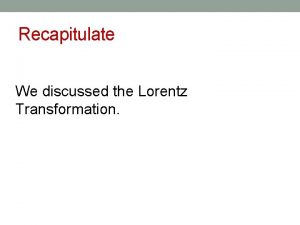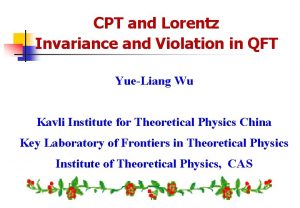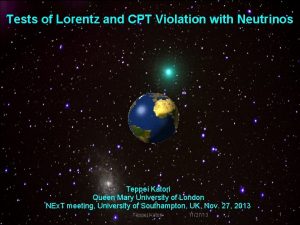Standard Model And HighEnergy Lorentz Violation Damiano Anselmi

![based on the hep-ph papers [0 a] D. A. , Standard Model Without Elementary based on the hep-ph papers [0 a] D. A. , Standard Model Without Elementary](https://slidetodoc.com/presentation_image_h2/4481e4aad22c6b7c33bf472397985c03/image-2.jpg)
![based on the hep-ph papers [0 a] D. A. , Standard Model Without Elementary based on the hep-ph papers [0 a] D. A. , Standard Model Without Elementary](https://slidetodoc.com/presentation_image_h2/4481e4aad22c6b7c33bf472397985c03/image-3.jpg)

























































































- Slides: 92

Standard Model And High-Energy Lorentz Violation, Damiano Anselmi 中国科学院理� 物理研究所 北京 2010年 4月6日
![based on the hepph papers 0 a D A Standard Model Without Elementary based on the hep-ph papers [0 a] D. A. , Standard Model Without Elementary](https://slidetodoc.com/presentation_image_h2/4481e4aad22c6b7c33bf472397985c03/image-2.jpg)
based on the hep-ph papers [0 a] D. A. , Standard Model Without Elementary Scalars And High Energy Lorentz Violation, Eur. Phys. J. C 65 (2010) 523 and ar. Xiv: 0904. 1849 [hep-ph] [0 b] D. A. , Weighted power counting, neutrino masses and Lorentz violating extensions of the Standard Model, Phys. Rev. D 79 (2009) 025017 and ar. Xiv: 0808. 3475 [hep-ph] [0 c] D. A. and M. Taiuti, Renormalization of high-energy Lorentz violating QED, Phys. Rev. D in press, arxiv: 0912. 0113 [hep-ph] [0 d] D. A. and E. Ciuffoli, Renormalization of high-energy Lorentz violating four fermion models, Phys. Rev. D in press, ar. Xiv: 1002. 2704 [hep-ph]
![based on the hepph papers 0 a D A Standard Model Without Elementary based on the hep-ph papers [0 a] D. A. , Standard Model Without Elementary](https://slidetodoc.com/presentation_image_h2/4481e4aad22c6b7c33bf472397985c03/image-3.jpg)
based on the hep-ph papers [0 a] D. A. , Standard Model Without Elementary Scalars And High Energy Lorentz Violation, Eur. Phys. J. C 65 (2010) 523 and ar. Xiv: 0904. 1849 [hep-ph] [0 b] D. A. , Weighted power counting, neutrino masses and Lorentz violating extensions of the Standard Model, Phys. Rev. D 79 (2009) 025017 and ar. Xiv: 0808. 3475 [hep-ph] [0 c] D. A. and M. Taiuti, Renormalization of high-energy Lorentz violating QED, Phys. Rev. D in press, arxiv: 0912. 0113 [hep-ph] [0 d] D. A. and E. Ciuffoli, Renormalization of high-energy Lorentz violating four fermion models, Phys. Rev. D in press, ar. Xiv: 1002. 2704 [hep-ph] and previous hep-th papers [1] D. A. and M. Halat, Renormalization of Lorentz violating theories, Phys. Rev. D 76 (2007) 125011 and arxiv: 0707. 2480 [hep-th] [2] D. A. , Weighted scale invariant quantum field theories, JHEP 02 (2008) 05 and arxiv: 0801. 1216 [hep-th] [3] D. A. , Weighted power counting and Lorentz violating gauge theories. I: General properties, Ann. Phys. 324 (2009) 874 and ar. Xiv: 0808. 3470 [hep-th] [4] D. A. , Weighted power counting and Lorentz violating gauge theories. II: Classification, Ann. Phys. 324 (2009) 1058 and ar. Xiv: 0808. 3474 [hep-th]

Lorentz symmetry is a basic ingredient of the Standard Model of particles physics.

Lorentz symmetry is a basic ingredient of the Standard Model of particles physics. However, several authors have argued that at high energies Lorentz symmetry and possibly CPT could be broken

Lorentz symmetry is a basic ingredient of the Standard Model of particles physics. However, several authors have argued that at high energies Lorentz symmetry and possibly CPT could be broken. The Lorentz violating parameters of the Standard Model (Colladay-Kostelecky) extended in the power-counting renormalizable sector have been measured with great precision.

Lorentz symmetry is a basic ingredient of the Standard Model of particles physics. However, several authors have argued that at high energies Lorentz symmetry and possibly CPT could be broken. The Lorentz violating parameters of the Standard Model (Colladay-Kostelecky) extended in the power-counting renormalizable sector have been measured with great precision. It turns out that Lorentz symmetry is a very precise symmetry of Nature, at least in low-energy domain.

Lorentz symmetry is a basic ingredient of the Standard Model of particles physics. However, several authors have argued that at high energies Lorentz symmetry and possibly CPT could be broken. The Lorentz violating parameters of the Standard Model (Colladay-Kostelecky) extended in the power-counting renormalizable sector have been measured with great precision. It turns out that Lorentz symmetry is a very precise symmetry of Nature, at least in low-energy domain. Several (dimensionless) parameters have bounds

Why is it interesting to consider quantum field theories where Lorentz symmetry is explicitly broken?

Why is it interesting to consider quantum field theories where Lorentz symmetry is explicitly broken? The set of power-counting renormalizable theories is considerably “small”

Why is it interesting to consider quantum field theories where Lorentz symmetry is explicitly broken? The set of power-counting renormalizable theories is considerably “small” Relaxing some assumptions can enlarge it, but often it enlarges it too much

Why is it interesting to consider quantum field theories where Lorentz symmetry is explicitly broken? The set of power-counting renormalizable theories is considerably “small” Relaxing some assumptions can enlarge it, but often it enlarges it too much Without locality in principle every theory can be made finite

Why is it interesting to consider quantum field theories where Lorentz symmetry is explicitly broken? The set of power-counting renormalizable theories is considerably “small” Relaxing some assumptions can enlarge it, but often it enlarges it too much Without locality in principle every theory can be made finite Without unitarity even gravity can be renormalized

Why is it interesting to consider quantum field theories where Lorentz symmetry is explicitly broken? The set of power-counting renormalizable theories is considerably “small” Relaxing some assumptions can enlarge it, but often it enlarges it too much Without locality in principle every theory can be made finite Without unitarity even gravity can be renormalized Relaxing Lorentz invariance appears to be interesting in its own right

Why is it interesting to consider quantum field theories where Lorentz symmetry is explicitly broken? The set of power-counting renormalizable theories is considerably “small” Relaxing some assumptions can enlarge it, but often it enlarges it too much Without locality in principle every theory can be made finite Without unitarity even gravity can be renormalized Relaxing Lorentz invariance appears to be interesting in its own right It could be useful to define the ultraviolet limit of quantum gravity and study extensions of the Standard Model

Why is it interesting to consider quantum field theories where Lorentz symmetry is explicitly broken? The set of power-counting renormalizable theories is considerably “small” Relaxing some assumptions can enlarge it, but often it enlarges it too much Without locality in principle every theory can be made finite Without unitarity even gravity can be renormalized Relaxing Lorentz invariance appears to be interesting in its own right It could be useful to define the ultraviolet limit of quantum gravity and study extensions of the Standard Model Here we are interested in the renormalization of Lorentz violating theories obtained improving the behavior of propagators with the help of higher space derivatives and study under which conditions no higher time derivatives are turned on to be consistent with unitarity

Why is it interesting to consider quantum field theories where Lorentz symmetry is explicitly broken? The set of power-counting renormalizable theories is considerably “small” Relaxing some assumptions can enlarge it, but often it enlarges it too much Without locality in principle every theory can be made finite Without unitarity even gravity can be renormalized Relaxing Lorentz invariance appears to be interesting in its own right It could be useful to define the ultraviolet limit of quantum gravity and study extensions of the Standard Model Here we are interested in the renormalization of Lorentz violating theories obtained improving the behavior of propagators with the help of higher space derivatives and study under which conditions no higher time derivatives are turned on to be consistent with unitarity The approach that I formulate is based of a modified criterion of power counting, dubbed weighted power counting

We may assume that there exists an energy range that is well described by a Lorentz violating, but CPT invariant quantum field theory. If the neutrino mass has the Lorentz violating origin we propose, then and the mentioned range spans at least 4 -5 orders of magnitude.

Scalar fields Break spacetime in two pieces: Break coordinates and momenta correspondingly: Consider the free theory This free theory is invariant under the “weighted” scale transformation is the “weighted dimension”

The propagator behaves better than usual in the barred directions Adding “weighted relevant’’ terms we get a free theory that flows to the previous one in the UV and to the Lorentz invariant free theory in the infrared (actually, the IR Lorentz recovery is much more subtle, see below)

Add vertices Call N = number of legs, constructed with their degrees under = extra label Other quadratic terms can be treated as “vertices” for the purposes of renormalization , and .

Consider a diagram G with L loops, I internal legs, E external legs and vertices of type (N , ) is a weighted measure of degree Performing a “weighted rescaling” of external momenta, together with a change of variables we see that is a homogeneous weighted function of degree Its overall divergent part is a homogeneous weighted polynomial of degree

Using the standard relations we get Where Renormalizable theories have Indeed implies

Writing we see that polynomiality demands and the maximal number of legs is E = 2 implies E > 2 implies 2 <2 Conclusion: renormalization does not turn on higher time derivatives

Examples n=2: six-dimensional -theory Strictly-renormalizable models are classically weighted scale invariant, namely invariant under The weighted scale invariance is anomalous at the quantum level

Four dimensional examples n=2 n=3

Källen-Lehman representation and unitarity Cutting rules

Causality Our theories satisfy Bogoliubov's definition of causality which is a simple consequence of the largest time equation and the cutting rules For the two-point function this is just the statement if immediate consequence of >0

Fermions The extension to fermions is straightforward. The free lagrangian is An example is the four fermion theory with An example of four dimensional scalar-fermion theory is

High-energy Lorentz violating QED

High-energy Lorentz violating QED Gauge symmetry is unmodified

High-energy Lorentz violating QED Gauge symmetry is unmodified A convenient gauge-fixing lagrangian is

Integrating the auxiliary field B away we find

Integrating the auxiliary field B away we find Propagators

Integrating the auxiliary field B away we find Propagators This gauge exhibits the renormalizability of theory, but not its unitarity

Coulomb gauge

Coulomb gauge

Coulomb gauge Two degrees of freedom with dispersion relation

Coulomb gauge Two degrees of freedom with dispersion relation The Coulomb gauge exhibits the unitarity of theory, but not its renormalizability

Coulomb gauge Two degrees of freedom with dispersion relation The Coulomb gauge exhibits the unitarity of theory, but not its renormalizability Correlation functions of gauge invariant objects are both unitary and renormalizable

Weighted power counting

Weighted power counting The theory is super-renormalizable Counterterms are just one- and two-loops

Weighted power counting The theory is super-renormalizable Counterterms are just one- and two-loops

High-energy one-loop renormalization

High-energy one-loop renormalization

High-energy one-loop renormalization

Low-energy renormalization

Low-energy renormalization

Low-energy renormalization Two cut-offs, with the identification

Low-energy renormalization Two cut-offs, with the identification Logarithmic divergences give

More generally, theory can have 2 n spatial derivatives, at most, which can improve the UV behavior even more.

More generally, theory can have 2 n spatial derivatives, at most, which can improve the UV behavior even more. The number n is crucial for the weighted power counting, together with the weighted dimension

More generally, theory can have 2 n spatial derivatives, at most, which can improve the UV behavior even more. The number n is crucial for the weighted power counting, together with the weighted dimension Our previous case had n=3 n=odd is necessary to describe chiral fermions

More generally, theory can have 2 n spatial derivatives, at most, which can improve the UV behavior even more. The number n is crucial for the weighted power counting, together with the weighted dimension Our previous case had n=3 n=odd is necessary to describe chiral fermions A general property of gauge theories is that in four dimensions gauge interactions are always super-renormalizable from the weighted power-counting viewpoint

More generally, theory can have 2 n spatial derivatives, at most, which can improve the UV behavior even more. The number n is crucial for the weighted power counting, together with the weighted dimension Our previous case had n=3 n=odd is necessary to describe chiral fermions A general property of gauge theories is that in four dimensions gauge interactions are always super-renormalizable from the weighted power-counting viewpoint Indeed, the weight of the gauge coupling is

The case allows us to formulate a consistent Lorentz violating extended Standard Model that contains both the dimension-5 vertex that gives Majorana masses to left-handed neutrinos after symmetry breaking,

The case allows us to formulate a consistent Lorentz violating extended Standard Model that contains both the dimension-5 vertex that gives Majorana masses to left-handed neutrinos after symmetry breaking, and the four fermion interactions that can describe proton decay. Such vertices are renormalizable by weighted power counting

The case allows us to formulate a consistent Lorentz violating extended Standard Model that contains both the dimension-5 vertex that gives Majorana masses to left-handed neutrinos after symmetry breaking, and the four fermion interactions that can describe proton decay. Such vertices are renormalizable by weighted power counting Matching the vertex with estimates of the electron neutrino Majorana mass the scale of Lorentz violation has roughly the value

The (simplified) model reads

The (simplified) model reads

The (simplified) model reads where

The (simplified) model reads where

The (simplified) model reads where

The (simplified) model reads where

The (simplified) model reads where At low energies we have the Colladay-Kostelecky Standard-Model Extension

The (simplified) model reads where At low energies we have the Colladay-Kostelecky Standard-Model Extension It can be shown that the gauge anomalies vanish, since they coincide with those of the Standard Model

The model simplifies enormously at high energies. Indeed, both gauge and Higgs interactions are super-renormalizable, so asymptotically free.

The model simplifies enormously at high energies. Indeed, both gauge and Higgs interactions are super-renormalizable, so asymptotically free. At very high energies gauge fields and Higgs boson decouple and theory becomes a four fermion model in two weighted dimensions.

The model simplifies enormously at high energies. Indeed, both gauge and Higgs interactions are super-renormalizable, so asymptotically free. At very high energies gauge fields and Higgs boson decouple and theory becomes a four fermion model in two weighted dimensions. Since four fermion vertices can trigger a Nambu—Jona-Lasinio mechanism, It is natural to enquire if we can do without the elementary Higgs field Indeed we can and the model then simplifies enormously

The scalarless model reads

The scalarless model reads where the kinetic terms are

To illustrate the Nambu—Jona-Lasinio mechanism in our case, consider the t-b model In the large Nc limit, where

To illustrate the Nambu—Jona-Lasinio mechanism in our case, consider the t-b model In the large Nc limit, where We can prove that is a minimum of the effective potential and gives masses to the fermions

The Lorentz violating fermionic mass terms are not turned on, so the Lorentz violation remains highly suppressed.

The Lorentz violating fermionic mass terms are not turned on, so the Lorentz violation remains highly suppressed. We can read the bound states from the effective potential. We find where

The Lorentz violating fermionic mass terms are not turned on, so the Lorentz violation remains highly suppressed. We can read the bound states from the effective potential. We find where Studying the poles we find

When gauge interactions are turned on, the Goldstone bosons are “eaten” by W’s and Z, as usual. Precisely, the effective potential becomes where

When gauge interactions are turned on, the Goldstone bosons are “eaten” by W’s and Z, as usual. Precisely, the effective potential becomes where Choosing the unitary gauge fixing we find the gauge-boson mass terms. The masses are

In particular, such relations give

In particular, such relations give Using our estimated value and the measured value of the Fermi constant, we find the top mass PDG gives 171. 2 2. 1 Ge. V

In particular, such relations give Using our estimated value and the measured value of the Fermi constant, we find the top mass PDG gives 171. 2 Moreover, for 2. 1 Ge. V

Conclusions A weighted power-counting criterion can be used to renormalize Lorentz violating theories that contain higher space derivatives, but no higher time derivatives

Conclusions A weighted power-counting criterion can be used to renormalize Lorentz violating theories that contain higher space derivatives, but no higher time derivatives Renormalizable theories can contain two scalar-two fermion vertices and four fermion vertices

Conclusions A weighted power-counting criterion can be used to renormalize Lorentz violating theories that contain higher space derivatives, but no higher time derivatives Renormalizable theories can contain two scalar-two fermion vertices and four fermion vertices We can construct an extended Standard Model that gives masses to left neutrinos without introducing right neutrinos or other extra fields. We can also describe proton decay

Conclusions A weighted power-counting criterion can be used to renormalize Lorentz violating theories that contain higher space derivatives, but no higher time derivatives Renormalizable theories can contain two scalar-two fermion vertices and four fermion vertices We can construct an extended Standard Model that gives masses to left neutrinos without introducing right neutrinos or other extra fields. We can also describe proton decay At very high energies gauge and Higgs interactions become negligible, since they are super-renormalizable, so the model becomes a four fermion model in two weighted dimensions.

Conclusions A weighted power-counting criterion can be used to renormalize Lorentz violating theories that contain higher space derivatives, but no higher time derivatives Renormalizable theories can contain two scalar-two fermion vertices and four fermion vertices We can construct an extended Standard Model that gives masses to left neutrinos without introducing right neutrinos or other extra fields. We can also describe proton decay At very high energies gauge and Higgs interactions become negligible, since they are super-renormalizable, so the model becomes a four fermion model in two weighted dimensions. It is thus natural to ask ourselves if the scalarless variant of the model is able to reproduce all known low-energy physics without the ambiguities of usual Nambu— Jona-Lasinio non-renormalizable approaches.

Conclusions A weighted power-counting criterion can be used to renormalize Lorentz violating theories that contain higher space derivatives, but no higher time derivatives Renormalizable theories can contain two scalar-two fermion vertices and four fermion vertices We can construct an extended Standard Model that gives masses to left neutrinos without introducing right neutrinos or other extra fields. We can also describe proton decay At very high energies gauge and Higgs interactions become negligible, since they are super-renormalizable, so the model becomes a four fermion model in two weighted dimensions. It is thus natural to ask ourselves if the scalarless variant of the model is able to reproduce all known low-energy physics without the ambiguities of usual Nambu— Jona-Lasinio non-renormalizable approaches. We have shown, in the leading order of the large Nc limit and with gauge interactions switched off, that the effective potential admits a Lorentz invariant (local) minimum, that gives masses to fermion and gauge bosons, and produces composite Higgs bosons.

We have shown that the scalarless model predicts relations among the parameters of the Standard Model. Our approximation has a good 50% of error, but one prediction, the relation between the top mass and the Fermi constant turns out to be in even too good agreement with experiment.

We have shown that the scalarless model predicts relations among the parameters of the Standard Model. Our approximation has a good 50% of error, but one prediction, the relation between the top mass and the Fermi constant turns out to be in even too good agreement with experiment. So far, we learn that Lorentz symmetry in flat space is not necessary for the consistency of quantum field theory. This leads us to question is the Universe exactly Lorentz invariant? If yes, WHY? Maybe only quantum gravity can resolve this issue

We have shown that the scalarless model predicts relations among the parameters of the Standard Model. Our approximation has a good 50% of error, but one prediction, the relation between the top mass and the Fermi constant turns out to be in even too good agreement with experiment. So far, we learn that Lorentz symmetry in flat space is not necessary for the consistency of quantum field theory. This leads us to question is the Universe exactly Lorentz invariant? If yes, WHY? Maybe only quantum gravity can resolve this issue High-energy Lorentz violations could allow us to define the ultraviolet limit of quantum gravity. Hopefully suitable mechanisms could make the violations undetectable even in principle

We have shown that the scalarless model predicts relations among the parameters of the Standard Model. Our approximation has a good 50% of error, but one prediction, the relation between the top mass and the Fermi constant turns out to be in even too good agreement with experiment. So far, we learn that Lorentz symmetry in flat space is not necessary for the consistency of quantum field theory. This leads us to question is the Universe exactly Lorentz invariant? If yes, WHY? Maybe only quantum gravity can resolve this issue High-energy Lorentz violations could allow us to define the ultraviolet limit of quantum gravity. Hopefully suitable mechanisms could make the violations undetectable even in principle Observe that is the weighted dimension where Lorentz violating gravity becomes strictly renormalizable. The real challenge is to break the local Lorentz symmetry without destroying unitarity.

We have shown that the scalarless model predicts relations among the parameters of the Standard Model. Our approximation has a good 50% of error, but one prediction, the relation between the top mass and the Fermi constant turns out to be in even too good agreement with experiment. So far, we learn that Lorentz symmetry in flat space is not necessary for the consistency of quantum field theory. This leads us to question is the Universe exactly Lorentz invariant? If yes, WHY? Maybe only quantum gravity can resolve this issue High-energy Lorentz violations could allow us to define the ultraviolet limit of quantum gravity. Hopefully suitable mechanisms could make the violations undetectable even in principle Observe that is the weighted dimension where Lorentz violating gravity becomes strictly renormalizable. The real challenge is to break the local Lorentz symmetry without destroying unitarity. If this were shown to be impossible, we would have a good reason to think that Lorentz invariance (and therefore CPT) must be exact at arbitrarily high energies.
 Mediatori didattici damiano
Mediatori didattici damiano Conversazione clinica damiano
Conversazione clinica damiano Damiano esguince
Damiano esguince Cavazzuti damiano biologia
Cavazzuti damiano biologia Mediatori didattici bruner
Mediatori didattici bruner Mediatori didattici simbolici esempi
Mediatori didattici simbolici esempi Cavazzuti damiano biologia
Cavazzuti damiano biologia Cavazzuti damiano biologia
Cavazzuti damiano biologia Ciclo dell'azoto zanichelli
Ciclo dell'azoto zanichelli Ecosistema stagno
Ecosistema stagno Yzyl
Yzyl Damiano fornasiere
Damiano fornasiere Daniela damiano
Daniela damiano Pauli exclusion principle
Pauli exclusion principle Charge parity violation
Charge parity violation Ferpa violation
Ferpa violation Communicator reward valence
Communicator reward valence Violation of cultural norms
Violation of cultural norms Communicator reward valence
Communicator reward valence Danielle's law violation
Danielle's law violation Virginia probation violation sentencing guidelines
Virginia probation violation sentencing guidelines When employees resort to unauthorized strike in violation
When employees resort to unauthorized strike in violation The recognized violation of cultural norms
The recognized violation of cultural norms Connecticut judicial branch
Connecticut judicial branch Judge muth east stroudsburg pa
Judge muth east stroudsburg pa Lsr violation
Lsr violation Sussex pledge
Sussex pledge Getting a driver license illegally may result in
Getting a driver license illegally may result in Vcs
Vcs Cp-violation
Cp-violation Education act 1982
Education act 1982 Aggie code
Aggie code Cp-violation
Cp-violation Prohibited acts under ra 9003
Prohibited acts under ra 9003 Type of violation
Type of violation Kaon cp violation
Kaon cp violation Code cave utilization
Code cave utilization Pauli exclusion principle violation
Pauli exclusion principle violation Tamu honor code violation
Tamu honor code violation Traffic control violation sap
Traffic control violation sap Example of mosaic plagiarism
Example of mosaic plagiarism Ferpa violation
Ferpa violation Ferpa hipaa
Ferpa hipaa Port security violation
Port security violation Standard error in statistics
Standard error in statistics Standard language meaning
Standard language meaning Standard costing meaning
Standard costing meaning Lorentz transformation matrix
Lorentz transformation matrix Psk lorentz
Psk lorentz Lorentz transformation equation derivation
Lorentz transformation equation derivation Hukum ohm
Hukum ohm Lorentz transformation derivation
Lorentz transformation derivation Pengertian gaya lorentz
Pengertian gaya lorentz Verso forza di lorentz
Verso forza di lorentz Forza di lorentz regola della mano destra
Forza di lorentz regola della mano destra Simplest derivation of lorentz transformation
Simplest derivation of lorentz transformation Momentum in relativity
Momentum in relativity Forza di lorentz zanichelli
Forza di lorentz zanichelli Lorentz angle
Lorentz angle Transformasi galileo
Transformasi galileo Lorentz
Lorentz Lorentz law
Lorentz law Lorentz transzformáció
Lorentz transzformáció Fanny lorentz
Fanny lorentz Lorentz
Lorentz Kontraksi lorentz
Kontraksi lorentz Si vuole dilatare un intervallo temporale del 15
Si vuole dilatare un intervallo temporale del 15 Onde trasversali
Onde trasversali What is lorentz factor
What is lorentz factor Sistemi non inerziali
Sistemi non inerziali Manyetik alan kuvveti
Manyetik alan kuvveti Lorentz
Lorentz Trasformazioni lorentz
Trasformazioni lorentz Lorentz
Lorentz Lorentz force class 12
Lorentz force class 12 F=qvb
F=qvb Diagramme espace temps
Diagramme espace temps Lorentz angle
Lorentz angle Gaya lorentz
Gaya lorentz Murid berkeperluan khas berkefungsian rendah
Murid berkeperluan khas berkefungsian rendah Standard deviation as a ruler and the normal model
Standard deviation as a ruler and the normal model Standard deviation as a ruler and the normal model
Standard deviation as a ruler and the normal model Multi nuclei zone model
Multi nuclei zone model Standard trade model
Standard trade model Standard social science model
Standard social science model Standard solar model
Standard solar model Standard model lagrangian
Standard model lagrangian Standard market model
Standard market model Standard model lagrangian
Standard model lagrangian Standard trade model
Standard trade model Standard model
Standard model Standard trade model
Standard trade model Standard urban model
Standard urban model

